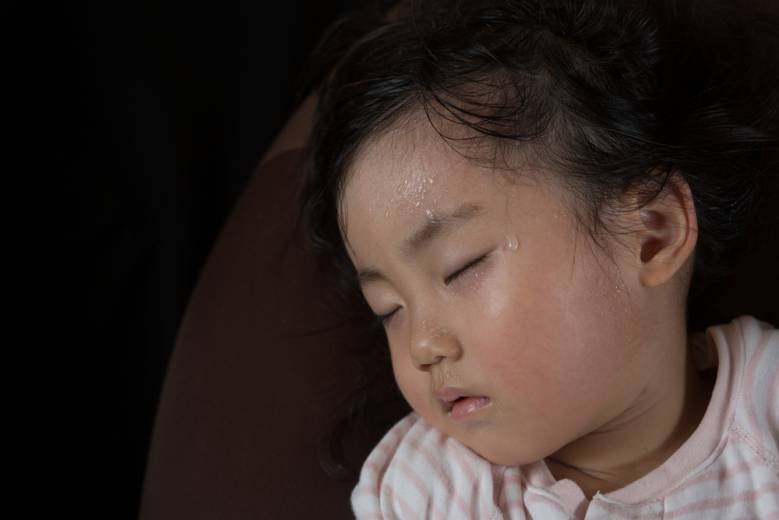
It is normal for a mother to get concerned about her child, especially if the baby sweats and they do not have a fever. Just like adults, babies, including infants have sweat glands in their heads and necks. Therefore, they are likely to perspire if the environment is too warm.
However, if your baby is experiencing excessive sweating or hyperhidrosis, it is advisable to consult a pediatrician.

Sometimes your baby may sweat a lot for regulating body temperature. This is a natural response to warm weather. Also, if she or he is heavily covered while in the house or while in the car seat, the child may perspire due to the high temperatures. If you are feeling too hot, then the child is feeling the same and you should probably avoid heavy covering on your child. If your house is cool, and the child is sweating, then consult a pediatrician.
It is common for a baby to experience excessive sweating at night. Night sweats may be due to various factors:
Night or cold sweats tend to occur if the baby has a cold/flu/or sinus infection/or fever. It helps the child cool down from the high temperature resulting from the infection. However, if your child is sweating and is not unwell, then you should speak to a doctor.
It is normal to have babies with sweaty hands, feet, or forehead. In some extreme cases, there are mothers whose bundles of joy happen to be clammy babies. However, as your child matures, their body is able to regulate the temperature which leads to reduced perspiration. In rare instances, hyperhidrosis is a sign of medical conditions such as endocrine conditions.
The baby’s hands and feet act as temperature regulators. This is because, at this stage, only the glands in the feet, head, and hands are active. If your child is overdressed, then they may start sweating at their hands, feet, or head. For a newborn, the baby is likely to experience hyperhidrosis on the head at night, due to limited circulation.
It is important to remember that the baby’s nervous system is not yet mature. As a result, they may perspire excessively when exposed to high humidity, or high temperature. It is only at about 9 months that the body’s regulation mechanism improves.
If your baby sweats a lot, then you should consider checking his or her room’s temperature. This is the best way to deal with baby sweating at night. Remember, if you’re feeling hot, then the child is feeling the same way. Also, you should hydrate him or her. Before putting him or her to sleep at night, make sure that he/she is hydrated to make up for the water lost as due to perspiration.
You should remember to dress your baby properly, including at night. Place him or her on a comfortable night clothing.
If you have a stroller, then you should get an air thermometer to check the temperature. You might discover that the child may be over-bundled and you might need to reduce their coverings.
As a rule of thumb, you should recognize that there is a difference between hyperhidrosis and normal sweating. Severe cases may be linked to a genetic factor. However, if you notice other signs such as being underweight, or the baby is relatively inactive, then it may be wise to take the child to be examined by a doctor.